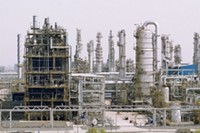Advertisement
Grab your lab coat. Let's get started
Welcome!
Welcome!
Create an account below to get 6 C&EN articles per month, receive newsletters and more - all free.
It seems this is your first time logging in online. Please enter the following information to continue.
As an ACS member you automatically get access to this site. All we need is few more details to create your reading experience.
Not you? Sign in with a different account.
Not you? Sign in with a different account.
ERROR 1
ERROR 1
ERROR 2
ERROR 2
ERROR 2
ERROR 2
ERROR 2
Password and Confirm password must match.
If you have an ACS member number, please enter it here so we can link this account to your membership. (optional)
ERROR 2
ACS values your privacy. By submitting your information, you are gaining access to C&EN and subscribing to our weekly newsletter. We use the information you provide to make your reading experience better, and we will never sell your data to third party members.
Business
China Backtracks On Plant Closure
Environment: Government may have second thoughts about shutting a p-xylene facility
by Jean-François Tremblay
January 16, 2012
| A version of this story appeared in
Volume 90, Issue 3

A petrochemical facility in Dalian, China, is still in operation months after the local government ordered its closure. Commissioned three years ago, the p-xylene plant is owned by the local conglomerate Fujia Group and Dalian Petrochemical, a subsidiary of PetroChina.
Last August, the government of the city of Dalian ordered the closure of the facility amid large public protests after a typhoon that nearly flooded it (C&EN, Sept. 26, 2011, page 20). Demonstrators fear that the plant poses a public threat because it is located only 10 miles from the center of Dalian and because several accidents had occurred in local chemical industry facilities earlier last year.
But the plant is still running. “They are still supplying their customers; they never stopped,” says Ashish Pujari, director of fibers and fiber feedstocks at the market research firm IHS Chemical in Singapore. Pujari notes that IHS is in regular contact with Fujia.
The Dalian government, Pujari believes, made a hasty decision when it ordered the closure and has quietly backtracked since. It’s not unusual for a p-xylene plant to be located near a city, Pujari observes. And local banks would suffer heavy losses on their loans to Fujia if the plant stopped operating, he adds.
It would be quite expensive to move the facility to a new location as the Dalian government has suggested, says Zailin Tang, office chief of the Dalian Environmental Protection Volunteers Association, a nongovernmental organization. And it’s unlikely that an ideal location could be found for the plant, he notes.
“The government is currently studying the situation in detail,” Tang says. “But where this plant is located now is not that different from how other p-xylene plants are located in other cities throughout the world.”
The Dalian government may in the end order the closure or relocation of the plant, Tang observes. But China needs the facility, he says. “It’s a fact that standards of living are rising in China, and we need industrial materials like p-xylene.”



Join the conversation
Contact the reporter
Submit a Letter to the Editor for publication
Engage with us on Twitter